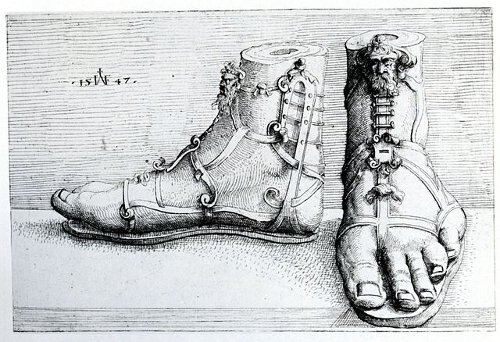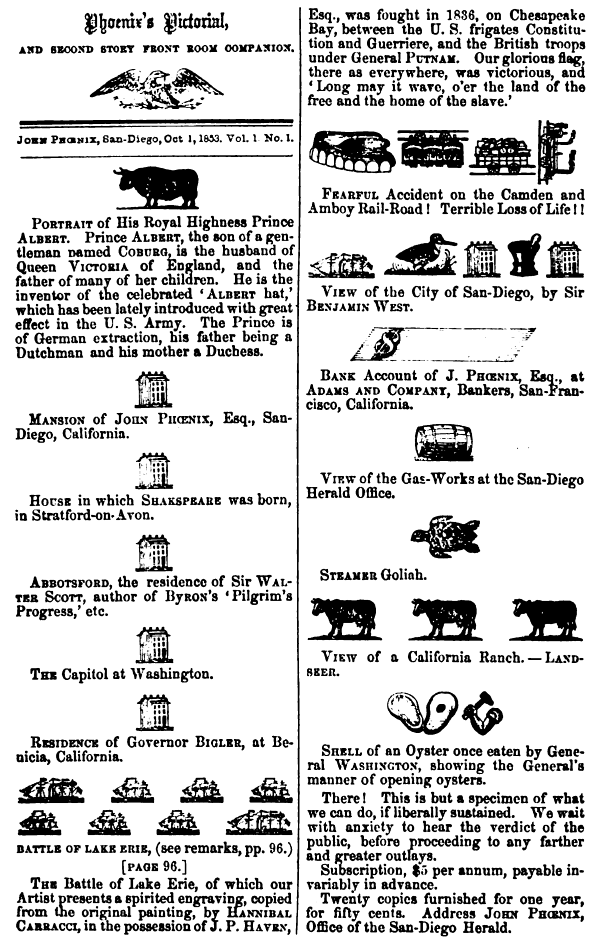When Einstein was traveling to lecture in Spain,
He questioned a conductor again and again:
“It may be a while,”
He asked with a smile,
“But when does Madrid reach this train?”
Humor
Telling Time
A letter from “J. A. McM.,” West Lynn, Mass., to Mark Twain, April 17, 1907:
Dear Sir:–
Apropos of your very entertaining little book on ‘English as she is Taught’ — the following true story fits in well — A teacher asked her class of boys to tell the difference between herself and a clock. A bright little urchin in the rear row raised his hand and said — ‘You have a face and the clock has a face, and you have got hands and the clock has got hands, and — and (reflecting) the clock has got a pendooleum and you aint.’
On the envelope Twain wrote, “Preserve this. Frame it. It is the second time in 40 years that a stranger has done me a courtesy & charged me nothing for it.”
Fare Play
Robert Benchley’s favorite joke, according to Harpo Marx in Harpo Speaks!, 1961:
A man gets on the train with his little boy, and gives the conductor only one ticket. ‘How old’s your kid?’ the conductor says, and the father says he’s four years old. ‘He looks at least twelve to me,’ says the conductor, and the father says, ‘Can I help it if he worries?’
Party Planning
An Englishman buys a horse and hires porters to take the horse up to his apartment on the fourth floor. The porters exert themselves and sweat. Finally they succeed in getting the horse to his apartment.
He asks them to put the horse in the bathtub.
After they finish the job, one of the porters asks him, “Why do you need a horse in the bathtub?”
The Englishman says, “Well, tomorrow evening I’m having a party at home. One of the guests will go into the bathroom, see the horse, come to me and say, ‘You know you have a horse in your bathtub.’ And I’ll tell him, ‘So what?'”
— Sion Rubi, Intelligent Jokes, 2004
A Lake Jaunt

In 1972 Canadian scientists R.W. Sheldon and S.R. Kerr set out to reason out the number of monsters that occupy Loch Ness. Because the creatures are reportedly large and rarely seen, it follows that their numbers must be small. (“It has been suggested from time to time that as the monsters are never caught it must therefore follow that they do not exist. This is both irresponsible and illogical.”)
By estimating the fish stock available in the loch, they determined that the total mass of monsters is between 3,135 and 15,675 kg. Taking the minimum monster size as 100 kg (“anything smaller is not suitably monstrous”), they estimate that the loch contains between 1 and 156 monsters. The high end of this range seems unlikely; and since monsters have been reported for centuries they’re probably breeding, which would require a population of at least 10.
Given the available quantity of fish and assuming a stable population, monsters weighing 100 kg would have to die at a rate of at least 3 per year. Larger animals would die less frequently, and this seems likely since dead monsters are never found (and since the juveniles that must replace them are never seen). So it seems the lake probably contains a small number of large monsters, perhaps 10-20 monsters weighing up to 1,500 kg each and measuring about 8 meters, “a size that agrees well with observational data.”
“We would like to thank Kate Kranck for drawing our attention to this problem, because until she mentioned it we were unaware that monsters were a problem.”
(“The Population Density of Monsters in Loch Ness,” Limnology and Oceanography 17:5, 796–798)
Special Projects
Facilities suggested by Lewis Carroll for a school of mathematics at Oxford, 1868:
- A very large room for calculating Greatest Common Measure. To this a small one might be attached for Least Common Multiple: this, however, might be dispensed with.
- A piece of open ground for keeping Roots and practising their extraction: it would be advisable to keep Square Roots by themselves, as their corners are apt to damage others.
- A room for reducing Fractions to their Lowest Terms. This should be provided with a cellar for keeping the Lowest Terms when found, which might also be available to the general body of Undergraduates, for the purpose of “keeping Terms.”
- A large room, which might be darkened, and fitted up with a magic lantern for the purpose of exhibiting Circulating Decimals in the act of circulation. This might also contain cupboards, fitted with glass-doors, for keeping the various Scales of Notation.
- A narrow strip of ground, railed off and carefully levelled, for investigating the properties of Asymptotes, and testing practically whether Parallel Lines meet or not: for this purpose it should reach, to use the expressive language of Euclid, “ever so far.”
He introduced this topic with an administrator by writing, “Dear Senior Censor,–In a desultory conversation on a point connected with the dinner at our high table, you incidentally remarked to me that lobster-sauce, ‘though a necessary adjunct to turbot, was not entirely wholesome.’ It is entirely unwholesome. I never ask for it without reluctance: I never take a second spoonful without a feeling of apprehension on the subject of possible nightmare. This naturally brings me to the subject of Mathematics …”
Bear Facts

The Veterinary Record of April 1, 1972, contained a curious article: “Some Observations on the Diseases of Brunus edwardii.” Veterinarian D.K. Blackmore and his colleagues examined 1,598 specimens of this species, which they said is “commonly kept in homes in the United Kingdom and other countries in Europe and North America.”
“Commonly-found syndromes included coagulation and clumping of stuffing, resulting in conditions similar to those described as bumble foot and ventral (rupture in the pig and cow respectively) alopecia, and ocular conditions which varied from mild squint to intermittent nystagmus and luxation of the eyeball. Micropthalmus and macropthalmus were frequently recorded in animals which had received unsuitable ocular prostheses.”
They found that diseases could be either traumatic or emotional. Acute traumatic conditions were characterized by loss of appendages, often the result of disputed ownership, and emotional disturbances seemed to be related to neglect. “Few adults (except perhaps the present authors) have any real affection for the species,” and as children mature, they tend to relegate these animals to an attic or cupboard, “where severe emotional disturbances develop.”
The authors urged their colleagues to take a greater interest in the clinical problems of the species. “It is hoped that this contribution will make the profession aware of its responsibilities, and it is suggested that veterinary students be given appropriate instruction and that postgraduate courses be established without delay.”
Digit Count

A letter from John Phillips of the Yale University School of Medicine to the New England Journal of Medicine, Feb. 14, 1991:
When referring to the hand, the names digitus pollicis, indicis, medius, annularis, and minimus specify the five fingers. In situations of clinical relevance the use of such names can preclude anatomical ambiguity. These time-tested terms have honored the fingers, but the toes have been labeled only by number, except of course the great toe, or hallux. Is it not time for the medical community to have the toes no longer stand up and merely be counted? I submit for consideration the following nomenclature to refer to the pedal digits: for the hallux, porcellus fori; for the second toe, p. domi; for the third toe, p. carnivorus; for the fourth toe, p. non voratus; and for the fifth toe, p. plorans domum.
Using porcellus as the diminutive form of porcus, or pig, one can translate the suggested terminology as follows: piglet at market, piglet at home, meat-eating piglet, piglet having not eaten, and piglet crying homeward, respectively.
(Thanks, Scott.)
Fore!

In 1962 mycologist R.W.G. Dennis reported a new species of fungus he had observed growing in Lancashire and East Africa. He called it Golfballia ambusta:
The unopened fruit body evidently closely resembles certain small, hard but elastic, spheres employed by the Caledonians in certain tribal rites, practised at all seasons of the year in enclosures of partially mown grass set apart for the purpose. The diameter of the volva is approximately 3 cm., its surface smooth or regularly furrowed, becoming much wrinkled after dehiscence, its texture extremely hard and tough. A gelatinous stratum, so characteristic of other phalloids, is wanting. The appearance and texture of the immature gleba is still unknown but at maturity it is extruded as a column, thickly set with short strap-like processes of an elastic consistency, each scarcely 1 cm. long and 1.5 mm. wide, abruptly truncated at the free end. As with other phalloids, there is a strong and distinctive odour, in this instance not unpleasant and identified independently by several observers as reminiscent of old or heated india-rubber. This is probably a reliable and important diagnostic character. Taste not recorded but probably mild; the fruit bodies are unlikely to be toxic but may well prove inedible from their texture. Spores have not been recovered and the means of reproduction therefore remains unknown.
It seems to be very prolific in America as well.
(R.W.G. Dennis. A remarkable new genus of phalloid in Lancashire and East Africa, Journ. Kew Guild. 8, 67 (1962): 181-182.)
Fun With Pictures
In 1853, lamenting the recent vogue for “illustrated newspapers,” American satirist John Phoenix (George Derby) offered an “an illustrated publication of unprecedented merit, containing engravings of exceeding costliness and rare beauty of design, got up on an expensive scale which never has been attempted before in this or any other country”:

